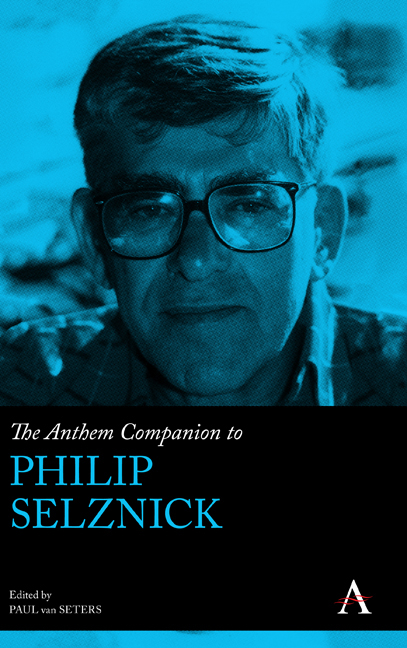Book contents
- Frontmatter
- Contents
- List of Contributors
- Chapter 1 The Intellectual Enterprise We Call Sociology
- Chapter 2 Philosophy for the Twice-Born: Selznick and Dewey in Dialogue
- Chapter 3 Power Relations across Organizations and Fields: Building on Selznick’s Concepts of Co-Optation and Institutionalization
- Chapter 4 Organizations, Institutions, and Law: The Sociological Significance of Philip Selznick’s Law, Society, and Industrial Justice
- Chapter 5 Post-Industrial Justice? Normativity and Empiricism in a Changing World of Work
- Chapter 6 The Promise of the Rule of Law Ideal
- Chapter 7 Philip Selznick on Law and Society: Democratic Ideals, Communitarianism, and Natural Law
- Chapter 8 Selznick’s Concepts of Culture and Community
- Chapter 9 A Symposium on The Moral Commonwealth
- Chapter 10 An Ecumenical Sensibility
- Index
Chapter 9 - A Symposium on The Moral Commonwealth
Published online by Cambridge University Press: 19 October 2021
- Frontmatter
- Contents
- List of Contributors
- Chapter 1 The Intellectual Enterprise We Call Sociology
- Chapter 2 Philosophy for the Twice-Born: Selznick and Dewey in Dialogue
- Chapter 3 Power Relations across Organizations and Fields: Building on Selznick’s Concepts of Co-Optation and Institutionalization
- Chapter 4 Organizations, Institutions, and Law: The Sociological Significance of Philip Selznick’s Law, Society, and Industrial Justice
- Chapter 5 Post-Industrial Justice? Normativity and Empiricism in a Changing World of Work
- Chapter 6 The Promise of the Rule of Law Ideal
- Chapter 7 Philip Selznick on Law and Society: Democratic Ideals, Communitarianism, and Natural Law
- Chapter 8 Selznick’s Concepts of Culture and Community
- Chapter 9 A Symposium on The Moral Commonwealth
- Chapter 10 An Ecumenical Sensibility
- Index
Summary
Introduction
Paul van Seters
Philip Selznick's The Moral Commonwealth was published in 1992. In 1993, the yearly meetings of the American Sociological Association (ASA) took place in Miami Beach, Florida, from August 13 to 17. Seymour Martin Lipset was ASA President and Committee Chair at the time. On August 16, an “Author Meets Critics” session was devoted to Selznick's new book. James S. Coleman (University of Chicago) had organized this session and was its chair. The critics were Douglas Heckathorn (University of Connecticut), Alan Silver (Columbia University), George Steinmetz (University of Chicago), and Alan Wolfe (New School of Social Research).
In 1994, The Newsletter of PEGS published a symposium on The Moral Commonwealth, to which Steinmetz and Heckathorn contributed the reviews they had prepared for the ASA “Author Meets Critics” session of the year before; Charles W. Anderson (University of Wisconsin, Madison) added a review; and Selznick responded to these three reviews. The PEGS Newsletter was published from 1991 to 1995 by Penn State University (PSU) Press, on behalf of the Committee on the Political Economy of the Good Society. In 1996, the name of the journal was changed to The Good Society. It appears biannually, still published by PSU Press.
In this chapter, we present the reviews by Anderson, Steinmetz, and Heckathorn, and the response by Selznick—all as published in the PEGS Newsletter in 1994. The original texts are only adjusted for style consistency (as in the references) and to correct typos and errors.
Philip Selznick's Classic Humanism
Charles W. Anderson
The remarkable thesis of Philip Selznick's The Moral Commonwealth is that we have the materials to resolve our moral uneasiness ready at hand. From the most familiar ideas of our century, the books we have all read, the conventional teachings of the social sciences, we can derive a public philosophy that is consistent with the strongest, most enduring ideals of our civilization. Thus we need not renounce the spirit of the age to return to ancient virtue, nor deconstruct our fabric of thought to achieve authenticity, nor try to prove rightfulness by clever new moves in game theory, a more sublime calculus of self-interest, nor pursue any of the other drastic and implausible strategies now fashionable in academic circles.
- Type
- Chapter
- Information
- The Anthem Companion to Philip Selznick , pp. 169 - 188Publisher: Anthem PressPrint publication year: 2021

